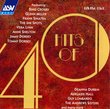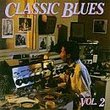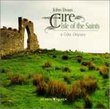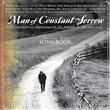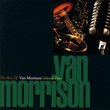| All Artists: Skip James Title: Hardtime Killing Floor Blues Members Wishing: 3 Total Copies: 0 Label: Biograph Release Date: 9/24/1992 Genres: Blues, Pop, R&B Styles: Delta Blues, Traditional Blues, Acoustic Blues, Piano Blues, Soul Number of Discs: 1 SwapaCD Credits: 1 UPC: 092631220025 |
Search - Skip James :: Hardtime Killing Floor Blues
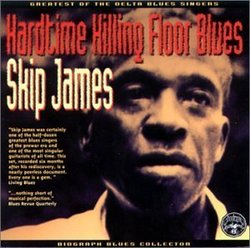 | Skip James Hardtime Killing Floor Blues Genres: Blues, Pop, R&B
|
Larger Image |
CD DetailsSimilarly Requested CDs
|
CD ReviewsA Primer on the 'Bentonia' Approach to Delta Blues Chuck Hicks | Concord, NC USA | 04/04/2000 (4 out of 5 stars) "Nehemiah Curtis 'Skip' James is credited as the founder of the 'Bentonia school' of Delta blues. In reality, James was the full embodiment of this idiom, and Biograph's 'Greatest of the Delta Blues Singers' is an excellent overview. The CD contains 12 songs James recorded in one sitting at Falls Church, VA, on December 16, 1964. These were the first recordings James had made since being 'rediscovered' in a Mississipi hospital earlier that year. On the track list are six works from the early days of Skip James' career, including the classics 'Hard Time Killing Floor Blues,' 'Devil Got My Woman,' 'Cherry Ball Blues,' and 'Cypress Grove Blues.' The remaining songs are either reworked Delta standards or newer material written by James. The listener will not be disappointed; the digital transfer of this recording is as impressive as the performances. 'Hardtime Killing Floor Blues' is considered by some as the penultimate Depression era song, and James' eerie performance here suggests what could be the lament of the downtrodden for all ages. His aged voice soars in a lonely falsetto against the backdrop of ominous bass string lines and nervous upper string picking. The guitar work throughout maintains this constant tension between low register anger and high-pitched fear. James' voice sounds as if it seeks escape from theses dark extremes. Unlike other Delta artists, James did not use a slide. His was an elaborate finger-picking style more akin to Piedmont bluesmen like Brownie McGhee and Cephas & Wiggins. He was also fond of using drop E tuning and dissonant solos to heighten the tension of his music. 'Sick Bed Blues,' written after James was diagnosed with cancer, contains passages where his guitar intentionally gallops away off-key, dramatically suggesting the artist's reaction to learning of his terminal illness. 'Greatest of the Delta Blues Singers' is not for the faint of heart. If genuine, painful blues is what the listener wants to experience, it doesn't get more brazen than this. Skip James was not simply the purveyor of a unique style; his music in many ways reflects the darkest shades of human nature." The Return of the Legend Caesar | college | 10/24/2002 (5 out of 5 stars) "The legendary Nehemiah "Skip" James made his first recordings with Paramount in the 1930s shortly before the label folded. Most of these have been tracked down on 78s and collected on "The Complete Early Recordings of Skip James", an essential album for blues aficionado.This album, however, includes some of the studio recordings made after his rediscovery on the 1960s. These are dramatically different than his early works, but to say that his musical ability diminished over the years is ludicrous.Most noticably, his voice changed. He sings with even more intimacy and heartbreak than before (although, after hearing the early recordings, that just doesn't seem possible!). His falsetto is more fragile, his moans are more painful, his words are sung with added meaning. Want to make your blood curl? First listen to the original "Hard Time Killing Floor Blues" from the 1930s. This is one of the most powerful blues songs ever recorded, fully documenting the poverty, murder, and horror of the Depression-era deep south. Then listen to the version of the same song on this album...the pacing is slower, the words are almost whispers, the guitar work is eerie and crawling, his voice is more fragile. He sounds broken. Thirty years of living penniless in the Mississippi Delta will do that to a man.James revisits all of his famous songs--"Killing Floor", "Devil Got My Woman", "Cypress Grove", "Cherry Ball"--all of which are very different from their original recordings. And it's all guitar work; James had apparently retired from piano playing by the time of his rediscovery. He includes a unique rendition of the folk-blues classic "Catfish Blues". He also gives us some new tracks--most outstanding are "Washington DC Hospital Center Blues" and "Sick Bed Blues", both of which are about his long battle with cancer, which ultimately claimed him just a couple years after these recordings.Some would argue that Skip James reached his peak in the 1930s and these later recordings are of lesser quality. I beg to differ--I'd say that he never lost it. He only grew older, and his music changed with him. Not only was his musical genius as strong as ever, he had lived through thirty years of hell--thus giving him the uncanny ability to drive the blues into your soul like a stake through the heart." A great CD that I wouldn't part with, but seldom listen to. Kazwailah | Ogden, UT United States | 10/09/2002 (5 out of 5 stars) "Haunting. I love this CD, oddly enough, I don't listen to it a whole lot because it sticks with me and has such an effect on my mood."
|

 Track Listings (12) - Disc #1
Track Listings (12) - Disc #1